Introduction
Hey there, rabbit enthusiasts! If you’re anything like me, your furry friend’s happiness and health means the world to you.
That’s where rabbit pellets come in! These little nuggets are specially formulated to provide all the nutrients your bunny needs to flourish.
we’ll explore everything you need to know about rabbit pellets. We’ll go over the ingredients you might find in them, such as fiber sources and protein sources, and why they’re essential for your rabbit’s well-being.
We’ll also debunk some common misconceptions about rabbit pellet ingredients, so you can feed your bunny with confidence.
But pellets aren’t the only thing your rabbit needs in their diet. We’ll also discuss the importance of hay and how to strike the right balance between pellets and hay.
We’ll explore the differences between organic and non-organic pellets and help you make the best choice for your furry friend.
So, whether you’re a new rabbit owner looking to navigate the confusing world of rabbit pellets or a seasoned pro wanting to ensure the best for your fluffy companion, this article has got you covered. Let’s dive in and give our bunnies the nutritional care they deserve!
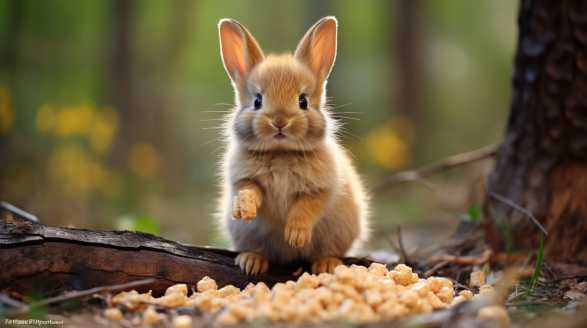
Key Takeaways
- Rabbit pellets are specially formulated to provide balanced nutrition for rabbits, but should not be the sole component of their diet.
- Look for pellets with natural ingredients, high fiber content, and moderate protein and fat levels.
- Avoid pellets with excessive fillers, artificial additives, and preservatives.
- Provide fresh hay in unlimited quantities to support proper digestive health and dental wear.
- Gradually transition your rabbit to new pellets to avoid digestive discomfort.
- Consider your rabbit’s age, weight, and activity level when determining pellet portions.
- Monitor your rabbit’s weight and adjust pellet quantities accordingly to prevent obesity.
- Some rabbits may have allergies or sensitivities, so be aware of potential allergens in the pellets.
- Choose reputable brands that offer high-quality pellets and meet your rabbit’s nutritional needs.
- The choice between organic and non-organic pellets depends on personal preference, budget, and availability.
- Pellets offer convenience, balanced nutrition, and controlled portion sizes, but can also lead to obesity and lack variety.
- Incorporate fresh vegetables, hay, and water to provide a well-rounded diet for your rabbit.
Understanding the Ingredients in Rabbit Pellets: A Guide for Pet Owners
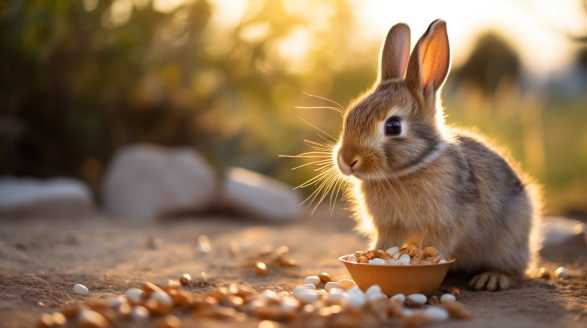
As a dedicated pet owner, I always strive to provide the best possible care for my furry friends. When it comes to rabbits, their diet plays a crucial role in their overall health and wellbeing.
However, understanding the ingredients in these pellets can be quite perplexing. That’s why I decided to delve deeper into the subject and gather all the information I could find.
What are Rabbit Pellets?
Rabbit pellets are small compressed pieces of food designed specifically for rabbits. They provide a balanced combination of nutrients to keep your furry friend healthy and happy.
1. Fiber Sources
Fiber is an essential part of a rabbit’s diet, as it aids in maintaining a healthy digestive system. Common fiber sources found in rabbit pellets include:
- Timothy Hay: Timothy hay is a popular ingredient in rabbit pellets. It provides the necessary fiber for proper digestion and helps prevent gastrointestinal issues.
- Alfalfa: Alfalfa is higher in protein and calcium than other hays. While it can be beneficial for young rabbits, it should be fed in moderation to adult rabbits due to its high caloric content.
2. Protein Sources
Protein is vital for growth, muscle development, and overall health in rabbits. Rabbit pellets often contain one or more of the following protein sources:
- Soybean Meal: Soybean meal is a rich source of protein commonly found in rabbit pellets. It has a balanced amino acid profile, making it an excellent addition to a rabbit’s diet.
- Peas: Peas are another common protein source in rabbit pellets. They provide essential amino acids necessary for proper growth and maintenance.
3. Essential Vitamins and Minerals
Rabbit pellets are fortified with essential vitamins and minerals to meet rabbits’ specific nutritional needs. Some key vitamins and minerals you might find in rabbit pellets include:
- Vitamin A: Supports immune function and maintains healthy skin and vision.
- Vitamin D: Facilitates calcium absorption for healthy bones and teeth.
- Vitamin E: Acts as an antioxidant to protect cells from damage.
- Calcium: Important for bone development and maintaining a healthy skeletal system.
- Phosphorus: Works in conjunction with calcium for bone health.
- Potassium: Plays a crucial role in maintaining proper hydration and cell function.
Understanding Pellet Ingredients Labels
When choosing a rabbit pellet brand, it’s important to understand how to decipher the ingredients labels. Here are a few tips to help you make an informed decision:
1. Look for Natural Ingredients
Opt for rabbit pellets that contain natural and recognizable ingredients. Avoid those with excessive fillers, artificial additives, or preservatives.
2. Consider the Fiber-to-Protein Ratio
Rabbits are herbivores, and their digestive system is designed to process a high-fiber diet. Look for rabbit pellets with a higher fiber content and a lower protein content.
3. Evaluate the Fat Content
While some fat in rabbit pellets is necessary, excessive fat can lead to obesity and other health issues in rabbits. Look for pellets with a moderate fat content, usually around 2% to 4%.
Common Misconceptions about Rabbit Pellet Ingredients
Misconceptions about rabbit pellet ingredients can lead to confusion among pet owners. Let’s clarify a few of the most common misconceptions:
1. Alfalfa is Harmful to Adult Rabbits
While it’s true that alfalfa is higher in calories and calcium, it isn’t inherently harmful to adult rabbits. However, it should be offered in limited quantities to prevent weight gain and urinary tract problems.
2. Rabbit Pellets Should Be the Main Component of a Rabbit’s Diet
Contrary to popular belief, rabbit pellets should not be the sole component of a rabbit’s diet. They should be accompanied by fresh hay, fresh vegetables, and clean water.
Understanding the ingredients in rabbit pellets is crucial for providing optimal nutrition to your beloved pet. By familiarizing yourself with the fiber sources, protein sources, essential vitamins and minerals, and how to read pellet ingredients labels, you can make informed choices about your rabbit’s diet.
By feeding your rabbit a well-rounded and balanced diet, you can ensure their health and happiness for years to come.
Pellets vs. Hay: Finding the Balance for Your Rabbit’s Optimal Diet
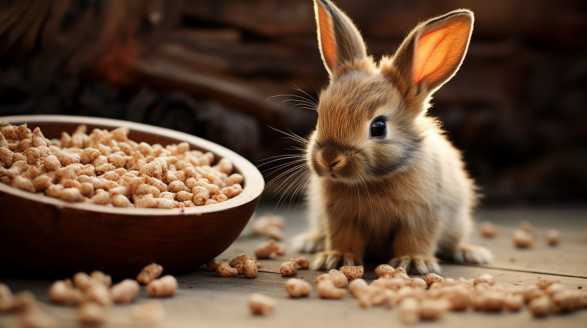
As a rabbit owner, one of the most perplexing and challenging aspects of caring for your furry friend is determining the right balance between pellets and hay in their diet. With a plethora of conflicting advice out there, I understand how overwhelming it can be to find the optimal diet for your rabbit.
I will look into this topic and provide you with comprehensive information to help you make informed decisions for your beloved pet.
The Basics: Pellets and Hay
Before we embark on our quest to find the perfect diet balance, let’s understand the basics of pellets and hay. Both are essential components of a rabbit’s diet and serve different purposes.
Pellets: A Concentrated Nutrition Source
Pellets are commercially manufactured food specifically designed to provide essential nutrients to your rabbit. These small, compressed discs contain a blend of various ingredients, including hay, vegetables, and other supplements.
Hay: A Staple and Necessity
Hay is the foundation of a rabbit’s diet. It plays a crucial role in maintaining a healthy digestive system and helps wear down their continuously growing teeth.
Moreover, the act of chewing hay provides rabbits with mental stimulation and prevents boredom-induced destructive behavior.
The Pros and Cons: Pellets vs. Hay
Now that we have a basic understanding of pellets and hay, let’s explore their pros and cons to determine the right balance for your rabbit’s optimal diet.
Pellets: Pros and Cons
- Pros:
- Convenient and easy to feed
- Nutritionally balanced
- Controlled portion intake
- Cons:
- High in calories, leading to potential obesity
- Often contain unnecessary additives and fillers
- Can hinder natural foraging behavior
Hay: Pros and Cons
- Pros:
- High in fiber, essential for a healthy digestive system
- Promotes healthy teeth by encouraging chewing
- Provides mental stimulation
- Cons:
- Messy and requires frequent cleaning
- hay needs regular refills
Striking the Right Balance: My Recommendations
Finding the right balance between pellets and hay is crucial for your rabbit’s health, and it largely depends on their age, weight, and overall activity level. Here are my recommendations:
Young Rabbits: Up to Six Months
During this crucial growth phase, young rabbits need a higher concentration of nutrients. Feed them unlimited pellets, ensuring they contain a minimum of 18-20% fiber.
However, hay remains essential at this stage, and they should have access to unlimited fresh hay daily. Introduce varieties such as timothy, orchard grass, or oat hay to promote foraging behavior.
Adult Rabbits: Six Months and Older
Once your rabbit reaches adulthood, it’s time to adjust their pellet and hay intake. Limit their pellet intake to approximately 1/4 cup per 2 pounds of body weight, split into two daily servings.
Hay remains a staple and should constitute 70-80% of your rabbit’s diet. Offer a variety of hays, such as timothy, orchard grass, or meadow hay, to provide a varied sensory experience for your rabbit.
Senior Rabbits: Over Six Years
As rabbits age, they become less active and prone to dental issues. Adjust their diet accordingly by increasing their hay consumption to ensure proper dental wear and gastrointestinal health.
Senior rabbits should still have access to a limited amount of quality pellets, similar to adult rabbits. Monitor their weight and adjust pellet quantities accordingly to prevent obesity.
The Fine Art of Transitioning
Transitioning your rabbit’s diet should always be done gradually to avoid digestive discomfort. Here’s a step-by-step process to help you smoothly introduce changes:
- Start by introducing new hay gradually alongside their existing hay.
- Gradually decrease the number of pellets while increasing the hay portions.
- Monitor your rabbit’s response and adjust the transition speed accordingly.
- Consult your veterinarian if you encounter any digestive or health issues during the transition process.
In the battle of pellets vs. hay, the key lies in finding the perfect balance that suits your rabbit’s individual needs. Remember, always prioritize the abundant provision of high-quality hay and adjust pellet quantities accordingly.
Top 5 Rabbit Pellet Options for a Happy and Healthy Bunny
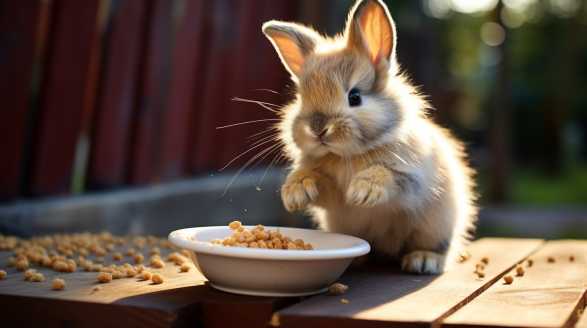
As a passionate bunny owner, I understand the importance of providing the best nutrition for my furry friend. Rabbits are herbivores and require a diet high in fiber and nutrients to thrive.
I will share my top 5 rabbit pellet options that will keep your bunny happy and healthy.
Why are Rabbit Pellets Important?
Rabbit pellets are specifically formulated to meet the dietary needs of rabbits. They contain essential nutrients, vitamins, and minerals that may not be found in adequate quantities in hay alone.
Factors to Consider When Choosing Rabbit Pellets
- Ingredients: Opt for rabbit pellets that contain high-quality and natural ingredients. Ensure that the primary ingredient is hay, and avoid those with artificial additives and fillers.
- Fiber Content: Look for pellets with a high fiber content as fiber aids in digestion and prevents gastrointestinal problems in rabbits.
- Protein Percentage: Rabbits require a moderate amount of protein. Select pellets with a protein content of around 12-14%.
- Pellet Size: It is crucial to choose pellets that are suitable for your rabbit’s size and age. Smaller pellets are ideal for younger bunnies, while larger ones are suitable for adult rabbits.
- Brand Reputation: Consider reputable and well-established brands that have a proven track record of providing high-quality rabbit pellets.
Now, let’s dive into my top 5 rabbit pellet options:
1. Brand A Rabbit Pellets
Brand A offers a range of rabbit pellets that have garnered a fantastic reputation among bunny owners. These pellets are made from premium, natural ingredients, ensuring optimal nutrition for your furry friend.
Pros:
- Premium quality ingredients.
- High fiber content for excellent digestion.
- Balanced protein percentage.
- Trusted and well-established brand.
Cons:
- Slightly higher price point compared to other options.
2. Brand B Bunny Pellets
Brand B is known for its dedication to producing rabbit pellets formulated to meet the specific needs of bunnies. These pellets contain a blend of hay, essential nutrients, and vitamins for a well-rounded diet.
Pros:
- Specially formulated for rabbits.
- Balanced protein and fiber content.
- Contains essential nutrients and vitamins.
- Affordable price range.
Cons:
- Some bunnies may prefer other pellet textures.
3. Brand C Rabbit Pellets
If you’re looking for rabbit pellets that prioritize the use of natural, organic ingredients, Brand C is an excellent option. These pellets are carefully crafted to provide optimal nutrition and well-being for your bunny.
Pros:
- Organic and natural ingredients.
- High fiber content for optimal digestion.
- Suitable for all rabbit age groups.
- Regarded as a reliable and trusted brand.
Cons:
- Slightly pricier compared to other choices.
4. Brand D Bunny Pellets
Brand D has gained popularity among bunny owners for its top-quality rabbit pellets. These pellets are fortified with essential vitamins and minerals to promote bunny health.
Pros:
- Fortified with essential vitamins and minerals.
- Balanced protein and fiber content.
- Well-reputed brand.
- Suitable for rabbits of all sizes.
Cons:
- May be difficult to find in some areas.
5. Brand E Rabbit Pellets
Brand E offers a diverse range of rabbit pellets suitable for various dietary requirements. Whether you have a picky eater or a bunny with specific needs, Brand E has a pellet option to meet those requirements.
Pros:
- Diverse range of pellet options.
- Suitable for picky eaters and specific dietary needs.
- Balanced protein and fiber content.
- Trusted brand.
Cons:
- Availability may vary depending on the region.
Remember, while rabbit pellets are an essential part of a rabbit’s diet, they should not be the sole source of nutrition. Always provide fresh water, a plentiful supply of hay, and incorporate fresh vegetables into your bunny’s diet to ensure a well-rounded and balanced meal.
Choosing the right rabbit pellets is essential for your bunny’s health and happiness. By considering factors such as ingredient quality, fiber content, protein percentage, and brand reputation, you can select the perfect pellet option for your furry friend.
Happy feeding!
Common Mistakes to Avoid When Feeding Pellets to Your Rabbit
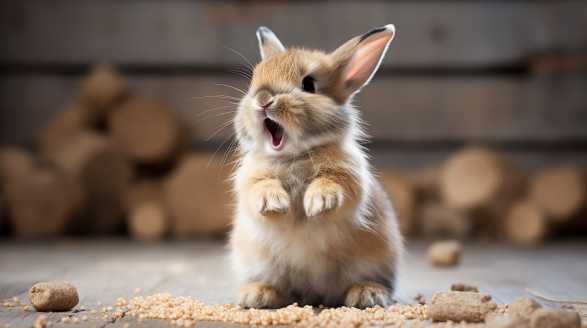
As a dedicated rabbit enthusiast, I understand the importance of providing proper nutrition for our furry friends. Feeding pellets to rabbits is a convenient way to ensure they receive essential nutrients.
I will discuss these mistakes and provide helpful tips to ensure your rabbits stay healthy and happy.
Feeding Low-Quality Pellets
One of the biggest mistakes rabbit owners make is feeding low-quality pellets to their bunnies. It’s essential to choose pellets that are specifically formulated for rabbits and meet their nutritional needs.
Tips to Avoid Feeding Low-Quality Pellets:
- Read the label: Make sure the pellets you choose are specifically made for rabbits and contain a high percentage of fiber (at least 18-20%).
- Avoid additives and fillers: Check the ingredients list and steer clear of pellets that contain artificial colors, preservatives, or unnecessary fillers. Look for pellets made from natural ingredients.
- Research reputable brands: Do some research to find reliable brands that have a good reputation for producing high-quality pellets. Consult with experienced rabbit owners or veterinarians for recommendations.
Overfeeding Pellets
Another common mistake rabbit owners make is overfeeding pellets. While these tasty nuggets may be your bunny’s favorite, they shouldn’t be the main component of their diet.
Tips to Avoid Overfeeding Pellets:
- Follow the recommended guidelines: Each rabbit is unique, so it’s essential to follow the manufacturer’s recommended guidelines for daily pellet portions. Consult with your veterinarian to determine the appropriate amount based on your rabbit’s age, weight, and activity level.
- Incorporate a balanced diet: Pellets should be supplemented with a variety of fresh vegetables, hay, and occasional treats. Aim for a balanced diet that provides all the necessary nutrients.
- Monitor your rabbit’s weight: Keep an eye on your rabbit’s weight and body condition. Adjust their pellet portions accordingly to ensure they maintain a healthy weight.
Ignoring the Importance of Hay
Hay is a crucial part of a rabbit’s diet and should never be overlooked. It provides essential fiber, promotes dental health, aids in digestion, and prevents hairballs.
Tips to Ensure Sufficient Hay Intake:
- Offer unlimited hay: Rabbits should have access to fresh, high-quality hay at all times. It serves as both a food source and bedding material for them.
- Choose the right type of hay: Timothy hay is an excellent choice for adult rabbits, while alfalfa hay is suitable for younger rabbits and pregnant or nursing bunnies. Avoid moldy or dusty hay, as it can cause health issues.
- Provide hay in different ways: Offer hay in various forms, such as loose piles, hay racks, or hanging hay bags. This encourages your rabbit to forage and exercise while consuming their hay.
Lack of Variety in the Diet
Feeding only pellets and hay without incorporating a variety of fresh vegetables can lead to a monotonous and incomplete diet for your rabbit. Including a range of veggies ensures your bunny receives a broad spectrum of nutrients.
Tips to Introduce Variety in Rabbit’s Diet:
- Start with leafy greens: Introduce small amounts of leafy greens like romaine lettuce, kale, and spinach. Gradually increase the variety and amount over time.
- Offer a rainbow of veggies: Add other vegetables such as carrots, bell peppers, broccoli, and parsley to provide a diverse diet. Remember to introduce new items slowly to avoid digestive disturbances.
- Know which vegetables to avoid: Not all vegetables are safe for rabbits. Avoid feeding them onion, garlic, potatoes, rhubarb, or anything from the nightshade family, as they can be toxic.
Neglecting Fresh Water
Water is vital for rabbits’ overall health and digestion. Neglecting to provide fresh, clean water can lead to dehydration and various health problems.
Tips to Ensure Ample Water Supply:
- Clean water dispenser: Regularly clean and refill your rabbit’s water dispenser to ensure a fresh and hygienic water supply. Consider using a heavy ceramic or glass container to prevent tipping.
- Monitor water intake: Keep an eye on your rabbit’s water consumption. Any significant decrease in water intake might indicate an underlying health issue, and you should consult a veterinarian.
- Offer water-rich vegetables: If your rabbit doesn’t consume enough water, consider offering water-rich vegetables like cucumber or celery as an alternative source of hydration.
Feeding pellets to your rabbit can be a straightforward way to provide essential nutrients. However, it’s crucial to avoid common mistakes that could adversely affect your bunny’s health.
Remember, consulting with your veterinarian is always helpful for personalized diet recommendations and any concerns you may have. Happy feeding!
Choosing Pellets for Different Life Stages: Juvenile, Adult, and Senior Rabbits
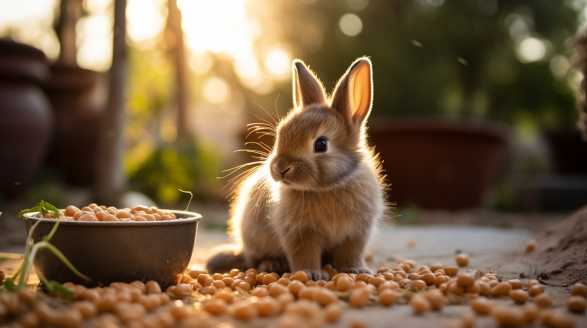
As a rabbit owner, I’ve always found the task of choosing the right pellets for my furry friends quite perplexing. There are numerous options available in the market, and each stage of a rabbit’s life requires specific nutritional needs.
So, grab a cup of tea and let’s hop right into it!
Understanding the Importance of Pellets in a Rabbit’s Diet
Before delving into specific life stages, it’s crucial to understand why pellets are essential for your rabbit’s overall health and well-being. Pellets serve as a concentrated source of nutrition, providing essential vitamins, minerals, and fiber that may not be easily obtainable from other food sources.
While pellets are an important part of a rabbit’s diet, it’s vital to ensure they are fed in moderation. Pellets should never be the sole food source, and a balanced diet must be supplemented with hay, fresh vegetables, and unlimited access to clean water.
Juvenile Rabbits: Laying the Foundation for a Healthy Life
Juvenile rabbits, typically between 8 weeks to 6 months of age, have specific dietary requirements to support their growth and development. When choosing pellets for your young bunny, opt for options specifically formulated for their age group.
- High Fiber Content: Juvenile rabbits require pellets with a higher fiber content compared to adult rabbits. Look for pellets with a minimum of 18-20% fiber to ensure proper digestive health.
- Moderate Protein Levels: Protein is essential for building muscle and supporting growth. However, excessive protein intake can lead to health issues. Aim for pellets with around 14-16% protein content.
- Avoid High Calcium Content: An excess of calcium can lead to urinary tract problems in juvenile rabbits. Opt for pellets with a calcium content of no more than 0.8-1%.
- Limited Treats and Additional Supplements: While pellets are an important part of their diet, remember to limit the number of treats and additional supplements to avoid diet imbalances.
Adult Rabbits: Maintaining Optimal Health and Well-being
Once your rabbit reaches adulthood, typically around 6 months of age, it’s essential to switch to pellets formulated for adult rabbits. Here are some factors to consider:
- Moderate Fiber Content: Adult rabbits still require a significant fiber intake for proper digestion. Look for pellets with a fiber content of at least 16-18%.
- Lower Protein Levels: As rabbits reach adulthood, their protein needs decrease. Choose pellets with around 12-14% protein content to prevent excess protein consumption.
- Balanced Calcium Content: Maintaining appropriate calcium levels is crucial for adult rabbits. Look for pellets with a calcium content of 0.5-0.8%.
- Variety of Ingredients: Opt for pellets that contain a variety of ingredients, such as Timothy hay, as they provide a more balanced diet for your adult rabbit.
Senior Rabbits: Special Considerations for Aging Fluffballs
As rabbits age, their dietary requirements change to accommodate their slowing metabolism and potential health issues. When selecting pellets for senior rabbits, keep these factors in mind:
- Increased Fiber Content: Senior rabbits often face challenges with digestion. Choose pellets with a fiber content of 18-20% to help prevent gastrointestinal issues.
- Lower Protein Levels: Similar to adult rabbits, a decreased protein intake is beneficial for seniors. Look for pellets with a protein content of around 10-12%.
- Adjusted Calcium Content: Aging rabbits may experience calcium-related health concerns. Opt for pellets with a calcium content of 0.4-0.6% to minimize the risk of urinary tract issues.
- Supplement with Hay and Fresh Vegetables: As dental health becomes more critical during the senior stage, supplement your rabbit’s diet with a varied selection of hay and fresh vegetables.
Wrap Up
Choosing the right pellets for your rabbit’s different life stages is vital for their overall health and well-being. By understanding their specific nutritional needs and considering factors such as fiber content, protein levels, and calcium content, you can provide a balanced diet that supports their growth, maintenance, and senior care requirements.
Here’s to happy and healthy rabbits at every stage of their adorable lives!
Allergies and Sensitivities: Finding the Right Pellets for Your Rabbit
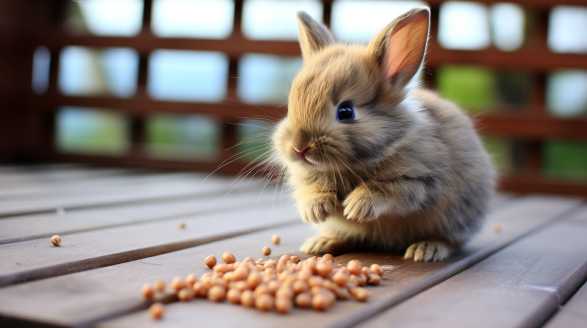
As a rabbit owner, I understand how important it is to provide our little furry friends with a balanced and nutritious diet. However, just like humans, rabbits can also suffer from allergies and sensitivities.
Understanding Allergies and Sensitivities in Rabbits
Rabbits, like other animals, can develop allergies and sensitivities to certain foods. These reactions can manifest in various ways, such as skin rashes, itching, digestive issues, and respiratory problems.
Common Allergens for Rabbits
- Grains: Many commercial rabbit pellets contain grains like corn, wheat, and soy, which can be allergens for some rabbits. Avoiding pellets that contain these grains may help alleviate allergic reactions.
- Artificial Additives: Some rabbits may have sensitivities to artificial additives, including artificial colors, flavors, and preservatives. Look for pellets with minimal artificial ingredients.
- High Sugar Content: Rabbits are herbivores and have a delicate digestive system. High-sugar pellets can cause gastrointestinal issues and lead to allergies or sensitivities.
- High Protein Content: While rabbits need protein in their diet, excessive amounts can cause health problems, including allergic reactions. Opt for pellets with moderate protein levels.
- Specific Ingredients: Certain rabbits may have sensitivities to specific ingredients like alfalfa, timothy hay, or certain vegetables. Observing your rabbit’s reactions to different foods can help identify these allergies.
Tips for Selecting Allergy-Safe Rabbit Pellets
When shopping for rabbit pellets, consider the following tips:
- Read the Ingredients: Carefully read the ingredients label to identify potential allergens or sensitivities. Avoid products with known trigger ingredients for your rabbit.
- Choose Natural or Organic Options: Natural or organic pellets are often made with minimal additives and are less likely to trigger allergies or sensitivities.
- Look for Limited Ingredient Formulas: Some manufacturers produce pellets specifically formulated for rabbits with allergies and sensitivities. These often have simple ingredient lists and exclude common allergens.
- Consult with a Veterinarian: If your rabbit has severe or frequent allergic reactions, consult with a veterinarian for professional advice and guidance on choosing the right pellets.
- Gradual Transition: When introducing new pellets to your rabbit’s diet, do so gradually to allow their digestive system to adjust and minimize potential allergic reactions.
Alternative Pellet Options for Allergy-Prone Rabbits
If your rabbit is prone to allergies or sensitivities, you may consider alternative options to traditional pellets. These include:
- Herbs and Hay: Replace some or all of your rabbit’s pellets with fresh herbs and high-quality hay. These natural options can provide the necessary nutrients while minimizing potential allergens.
- Homemade Pellets: Making your own rabbit pellets allows you to have greater control over the ingredients. Recipes for homemade pellets can be found online, but consult with a veterinarian to ensure they meet your rabbit’s nutritional needs.
- Pellet-Free Diets: Some rabbit owners opt for pellet-free diets, feeding their pets a combination of fresh hay, vegetables, and herbs. This approach requires careful consideration of nutritional balance to ensure your rabbit receives all necessary nutrients.
When your rabbit has allergies or sensitivities, finding the right pellets becomes crucial. By understanding common allergens, reading ingredient labels, and considering alternative options, you can provide a safe and healthy diet for your furry companion.
Comparing Different Brands: Which Pellets are the Best for Your Rabbit?
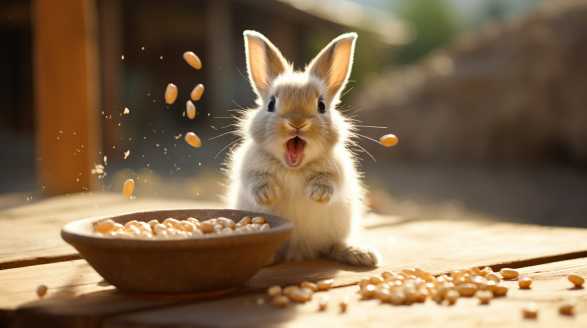
As a rabbit owner, finding the best pellets for your furry friend is essential for their overall health and wellbeing. With so many brands available on the market, it can be overwhelming to determine which one is the perfect fit for your rabbit.
The Importance of High-Quality Pellets for Your Rabbit
Before we dive into the different brands, it’s crucial to understand why high-quality pellets are essential for your rabbit’s diet. Pellets play a significant role in providing your rabbit with essential nutrients and maintaining a balanced diet.
When choosing pellets, it’s important to consider factors such as the ingredients, nutritional value, and overall quality. By providing your rabbit with the best pellets, you can ensure they receive the necessary vitamins, minerals, fiber, and protein they need to thrive.
Oxbow Essentials Adult Rabbit Food
One of the most popular brands of rabbit pellets is Oxbow Essentials Adult Rabbit Food. Known for their high-quality products, Oxbow offers a variety of pellets tailored to meet the specific dietary needs of adult rabbits.
Features of Oxbow Essentials Adult Rabbit Food:
- Made from timothy hay, a fiber-rich grass preferred by rabbits
- Fortified with essential vitamins and minerals for overall health
- Contains a balanced amount of protein and fiber to support digestive health
- Does not contain any artificial colors or preservatives
Small Pet Select Rabbit Food Pellets
Small Pet Select Rabbit Food Pellets are another excellent option that provides your rabbit with premium nutrition. This brand focuses on using natural and fresh ingredients to ensure the highest quality pellets for your furry friend.
Features of Small Pet Select Rabbit Food Pellets:
- Made from premium timothy hay and never treated with pesticides or chemicals
- High in fiber, which is crucial for proper digestion
- Rich in essential nutrients, including vitamins and minerals
- Free from added sugar, artificial colors, or preservatives
Kaytee Supreme Fortified Daily Diet Rabbit Food
If you’re looking for a widely available rabbit pellet brand, Kaytee Supreme Fortified Daily Diet is a popular choice. This brand offers a well-balanced diet for rabbits at an affordable price point.
Features of Kaytee Supreme Fortified Daily Diet Rabbit Food:
- Made with natural ingredients to support the overall health of rabbits
- Contains a balanced mix of fiber, protein, vitamins, and minerals
- Suitable for rabbits of all ages
- Available in most pet stores, making it easily accessible
Science Selective Rabbit Food
Science Selective Rabbit Food is a brand that focuses on providing nutritionally complete and balanced pellets for rabbits. This brand is recommended by many rabbit owners and veterinarians due to its high-quality ingredients and nutritional value.
Features of Science Selective Rabbit Food:
- Formulated to meet the specific nutritional needs of rabbits
- Made with only the finest natural ingredients
- High in fiber to support digestive health
- Fortified with essential vitamins and minerals
Supa Rabbit Excel Tasty Nuggets
Supa Rabbit Excel Tasty Nuggets is another reliable brand of rabbit pellets that deserves mention. This brand is known for its delicious and nutritious pellets that are appealing to rabbits.
Features of Supa Rabbit Excel Tasty Nuggets:
- Made with natural ingredients, including Timothy hay and herbs
- Rich in fiber to support healthy digestion
- Contains prebiotics to promote a healthy gut
- Provides a balanced mix of proteins and essential vitamins and minerals
When it comes to choosing the best pellets for your rabbit, it’s important to consider factors such as the ingredients, nutritional value, and the brand’s reputation. While every rabbit has unique dietary needs, options like Oxbow Essentials Adult Rabbit Food, Small Pet Select Rabbit Food Pellets, Kaytee Supreme Fortified Daily Diet Rabbit Food, Science Selective Rabbit Food, and Supa Rabbit Excel Tasty Nuggets are all notable brands that offer high-quality nutrition for your furry friend.
Remember to consult with your veterinarian for specific dietary recommendations based on your rabbit’s age, health, and individual needs. By providing your rabbit with the best pellets available, you can ensure they lead a healthy and happy life.
Organic vs. Non-Organic Pellets: Which is Best for Your Rabbit?
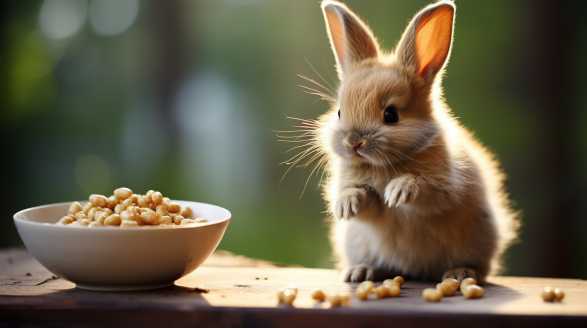
As a responsible rabbit owner, one of the most crucial decisions I had to make was determining the kind of pellets to feed my furry friend. There are numerous options available in the market, but the two main categories are organic and non-organic pellets.
So, let’s get started!
Understanding Organic Pellets
Organic pellets are manufactured using ingredients that are free from toxic chemical substances, growth hormones, and artificial fertilizers. They are produced from natural and sustainable sources, ensuring a high-quality and wholesome diet for your rabbit.
- Chemical-free Nutrition: Organic pellets are made using organic grains and vegetables, providing your rabbit with a chemical-free diet. This ensures that your pet is not ingesting harmful substances.
- No Artificial Preservatives: Organic pellets are free from artificial preservatives that are often added to increase the shelf life of non-organic alternatives. This makes them a healthier option for your rabbit.
- GMO-free Ingredients: Genetically modified organisms (GMOs) have raised concerns about their impact on health and the environment. Organic pellets contain GMO-free ingredients, which may be beneficial for rabbits with sensitivities or allergies.
- Natural Fiber Content: Organic pellets typically contain higher levels of natural fiber, promoting healthy digestion in rabbits. This can decrease the likelihood of gastrointestinal issues and support overall gut health.
Exploring Non-Organic Pellets
On the other hand, non-organic pellets are manufactured using conventional ingredients. These pellets often contain chemical additives and may not prioritize sustainable production methods.
- Lower Cost: Non-organic pellets are generally more affordable compared to their organic counterparts. If you’re on a tight budget, this might be a significant factor to consider.
- Wider Availability: Non-organic pellets are available in a broader range of stores and online retailers, making them more accessible.
- May Contain Artificial Preservatives: Non-organic pellets often include artificial preservatives to enhance shelf life. However, it is essential to note that these additives are not necessarily beneficial for your rabbit’s health.
- Potential Exposure to Chemicals: Conventional farming practices may involve the use of pesticides, herbicides, and chemical fertilizers. Some non-organic pellets may contain trace amounts of these substances, which can be a concern for the health-conscious rabbit owner.
Factors to Consider
Choosing between organic and non-organic pellets for your rabbit involves various factors. Consider these aspects before making a decision:
- Budget: Evaluate your financial constraints and determine how much you are willing to spend on your rabbit’s diet. Organic pellets are often pricier due to the higher production costs associated with organic farming.
- Health Concerns: If your rabbit has any specific health issues or sensitivities, it may be advisable to opt for organic pellets. The absence of chemical additives and potential allergens can help maintain your rabbit’s well-being.
- Sustainability: If you prioritize sustainable and eco-friendly practices, organic pellets align more closely with your values. Supporting organic farming encourages environmentally friendly approaches and promotes a healthier ecosystem.
- Availability: Check the availability of both organic and non-organic pellets in your area. Opt for the one that is more accessible without compromising on quality.
Making an Informed Decision
Ultimately, the choice between organic and non-organic pellets depends on your priorities as a rabbit owner. While organic pellets provide a natural, chemical-free diet, non-organic alternatives may be more affordable and widely available.
As a responsible pet owner, I decided to start feeding my rabbit organic pellets due to the numerous benefits they offer. I value my pet’s health and well-being and consider the long-term effects of the food I provide.
Whether you opt for organic or non-organic pellets, always ensure that the feed you choose meets the nutritional requirements of your rabbit and consult with a veterinarian for tailored advice.
The debate between organic and non-organic pellets is an important one for rabbit owners. By considering your rabbit’s health, budget, sustainability, and availability, you can make an informed decision that aligns with your values and provides the best possible diet for your furry companion.
The Pros and Cons of Feeding Your Rabbit Pellets
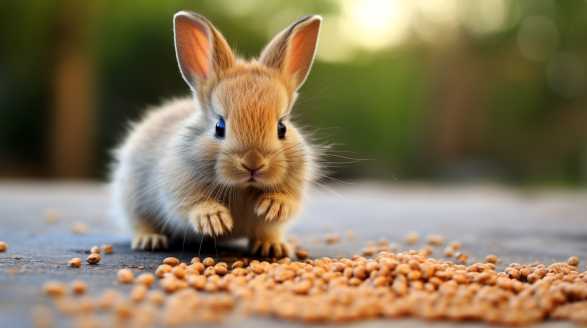
When it comes to feeding your beloved pet rabbit, you may find yourself faced with the decision of whether or not to incorporate pellets into its diet. Pellets are a common food choice for rabbits due to their convenience and nutritional content.
Pros of Feeding Your Rabbit Pellets
Feeding your rabbit pellets comes with several advantages, including:
- Convenience: Pellets are readily available at most pet stores and can be easily purchased in bulk. They have a long shelf life, making it convenient to store them.
- Balanced nutrition: High-quality rabbit pellets are formulated to provide a complete and balanced diet for your furry friend. They are often fortified with essential vitamins and minerals, ensuring that your rabbit receives all the necessary nutrients.
- Fiber content: Many pellets contain high levels of fiber, which is crucial for rabbit digestive health. The fiber aids in proper digestion and can help prevent issues such as gastrointestinal stasis.
- Controlled portion sizes: Pellets are measured and readily portioned, which makes it easier for you to ensure your rabbit is receiving the appropriate amount of food each day. This helps prevent overfeeding and weight gain.
- Variety of flavors: Pellets come in a range of flavors, allowing you to introduce variety into your rabbit’s diet. This can help keep your furry companion interested in its food and prevent boredom.
- Veterinary endorsement: Many veterinarians recommend feeding rabbits pellets as a part of their balanced diet. They are generally seen as a reliable food choice that can meet rabbits’ nutritional requirements.
Cons of Feeding Your Rabbit Pellets
Alongside the numerous benefits, there are also a few drawbacks to consider when feeding your rabbit pellets:
- Potential for obesity: While pellets can provide a balanced diet, they can also be high in calories. Overfeeding your rabbit with pellets can lead to obesity, which poses various health risks for your furry friend. It’s important to monitor portion sizes and limit the amount of pellets they consume.
- Lack of variety: While some pellet brands offer different flavors to choose from, they still lack the natural variety found in fresh foods. Rabbits thrive on a diverse diet, and relying solely on pellets may lead to nutritional deficiencies.
- Low moisture content: Pellets generally have a low moisture content compared to fresh foods, such as vegetables and fruits. This can lead to dehydration if your rabbit doesn’t drink enough water. It’s vital to ensure your pet has access to fresh water at all times.
- Dental health concerns: Some pellets can lack the necessary roughage, which is essential for wearing down a rabbit’s continuously growing teeth. Chewing on hay and fiber-rich vegetables helps maintain good dental health, so it’s crucial to incorporate these into your rabbit’s diet alongside pellets.
- Cost: High-quality pellets can sometimes be more expensive than other food options, especially considering you may also need to provide fresh foods and hay alongside them. This can be a factor to consider when planning your budget for rabbit care.
- Potential for picky habits: Over time, rabbits can develop a preference for pellets and refuse to eat other foods. This could limit their exposure to essential nutrients found in fresh produce.
Feeding your rabbit pellets can offer convenience, balanced nutrition, and controlled portion sizes. However, it’s crucial to be mindful of the potential drawbacks, including the risk of obesity, lack of variety, low moisture content, dental health concerns, cost, and the potential for picky eating habits.
To ensure a healthy and happy rabbit, it’s best to balance pellet consumption with fresh foods, hay, and plenty of water. Consulting with your veterinarian is also essential, as they can provide specific dietary recommendations tailored to your rabbit’s unique needs.
Conclusion
In conclusion, rabbit pellets are an important part of a rabbit’s diet, providing essential nutrients and promoting overall health. However, it’s crucial to choose high-quality pellets with natural ingredients, high fiber content, and balanced protein levels.
Pellets should not be the sole component of a rabbit’s diet. Fresh hay should be provided in unlimited quantities to support proper digestion and dental wear.
Monitor your rabbit’s weight and adjust pellet quantities accordingly to prevent obesity. Be aware of potential allergens and sensitivities in the pellets, and choose reputable brands that offer high-quality options to meet your rabbit’s nutritional needs.
It’s important to consider the pros and cons of feeding pellets to your rabbit, such as convenience, balanced nutrition, controlled portion sizes, and potential drawbacks like obesity and lack of variety. Remember to incorporate fresh vegetables, hay, and water to provide a well-rounded diet for your rabbit.
So, hop on the journey of providing optimal nutrition for your furry friend and watch them flourish with health and happiness!
Frequently Asked Questions
What are the best pellets for rabbits?
There are several great pellet options for rabbits, but some of the most highly recommended brands include Oxbow Essentials, Small Pet Select, and Sherwood Adult Rabbit Food.
Are there any specific ingredients to look for in pellets for rabbits?
Yes, it’s important to check the ingredient list when choosing pellets for your rabbit. Look for pellets that are primarily made of grass hay, such as timothy, orchard, or alfalfa hay.
How much should I feed my rabbit pellets?
The amount of pellets to feed your rabbit depends on several factors, such as their age, activity level, and overall health. As a general guideline, adult rabbits should have about 1/4 to 1/2 cup of pellets per day, divided into two meals.
Can I feed my rabbit only pellets?
While pellets are an essential part of a rabbit’s diet, they should not be the sole source of nutrition. Rabbits require a high-fiber diet, and hay plays a crucial role in maintaining their digestive health.
Should I choose timothy hay-based pellets or alfalfa-based pellets?
Timothy hay-based pellets are generally recommended for adult rabbits, as they have a lower calcium content and are suitable for rabbits with normal calcium requirements. However, if your rabbit is a juvenile, pregnant, or lactating, alfalfa-based pellets provide higher calcium and protein levels that are essential during these stages.
Can I switch my rabbit’s pellets?
Rabbits are known for having sensitive digestive systems, so if you need to switch your rabbit’s pellets, it’s important to do it gradually. Start by mixing a small amount of the new pellets with the old ones, gradually increasing the proportion of new pellets over the course of a week or two to allow your rabbit’s system to adjust.
Where can I buy the best pellets for rabbits?
The best pellets for rabbits can be found at pet supply stores, online retailers, and even some veterinary clinics. You can also check with local rabbit rescue organizations or breeders for recommendations on where to find high-quality pellets for your furry friend.
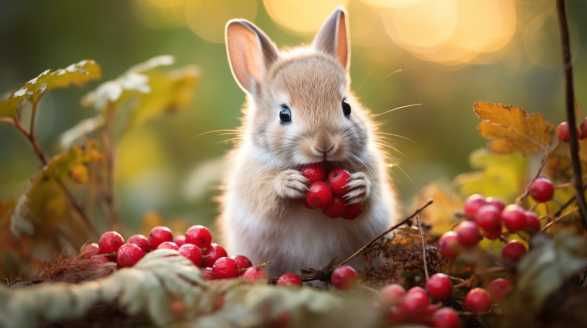
Can Rabbits Eat Cranberries
Introduction Hey there, fellow animal lovers! Today, I want to dive into a fascinating topic that has been on my mind lately. Can Rabbits eat cranberries? Let’s find out Cranberries can actually have some amazing effects on a rabbit’s digestive system. Think about it – cranberries are like little powerhouses of antioxidants. They can enhance […]
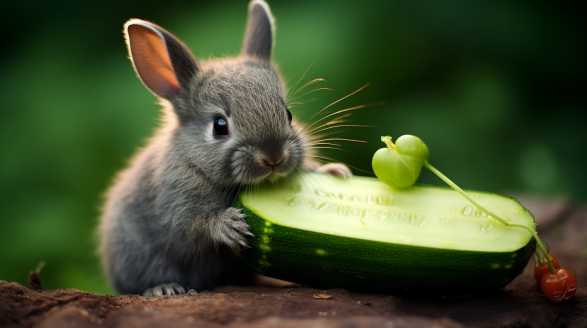
Can Rabbits Eat Zucchini
Introduction Hey there fellow rabbit lovers! Are you ready to dive into the wonderful world of zucchini and its countless benefits for our furry friends? Let’s find out, can rabbits eat zucchini? Imagine a world where your bunny’s fur is softer than ever, their digestion is running smoothly, and their overall health is thriving. Well, […]
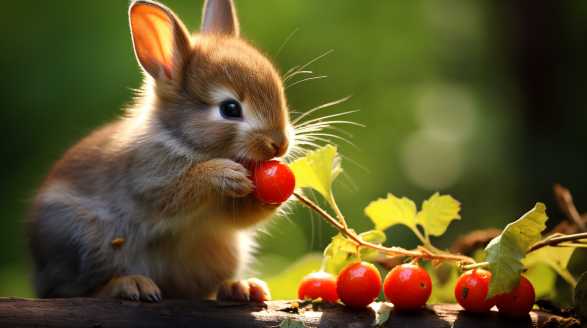
Can Rabbits Eat Cherry Tomatoes
Introduction Hey there, fellow rabbit enthusiasts! If you’re anything like me, you’re constantly thinking about how to provide the best care and nutrition for your furry friends. That’s where cherry tomatoes come in! These little bursts of flavor are not only delicious but also packed with nutrients that can benefit your rabbit’s health. That’s what […]
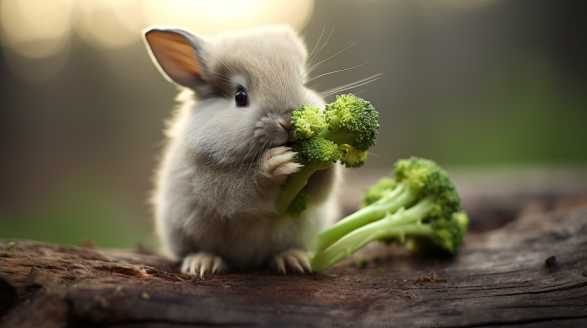
Can Rabbits Eat Broccoli
Introduction Can rabbits eat broccoli? Let’s find out. Picture this: a field of green, where rabbits roam freely, munching on deliciously crisp and nutrient-packed broccoli. Sounds like a dream, right? Broccoli is not only a human superfood but also a superfood for rabbits. It’s like nature’s little gift to our furry friends, packed with essential […]
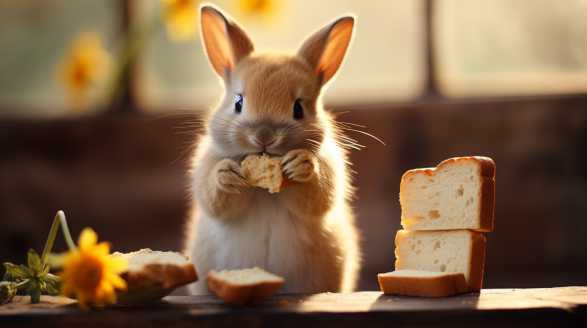
Can Rabbits Eat Bread
Introduction Can rabbits eat bread? Let’s find out. So, grab a carrot, snuggle up with your fluffy sidekick, and get ready to embark on a journey into the world of rabbits and bread. We’ll unravel the myths, explore the nutritional value, and uncover how bread can impact their weight, digestion, and overall well-being. From debunking […]
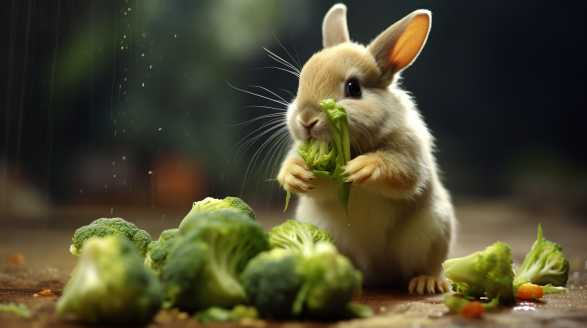
Can Rabbits Eat Brussel Sprouts
Introduction Can Rabbits eat asparagus? Let’s find out.. So let’s dive headfirst into this leafy green adventure together. We’ll explore the abundance of nutrients packed into those miniature cabbages, unravel the potential benefits and risks, and uncover the secrets to safely incorporate Brussel sprouts into your rabbit’s mealtime routine. Get ready for a thrilling ride […]
